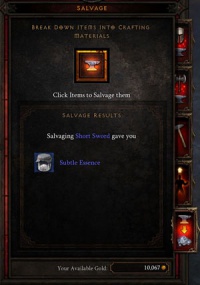Difference between revisions of "Salvage"
m (salvaging a gemmed item info) |
|||
| Line 23: | Line 23: | ||
Salvaged items can not be recovered; unlike the [[buyback]] option for sold items, once an item is salvaged, it's gone forever. The tooltip warning to the right is from the Nephalem Cube, but it's identical in function and severity when the Blacksmith is doing the salvaging. | Salvaged items can not be recovered; unlike the [[buyback]] option for sold items, once an item is salvaged, it's gone forever. The tooltip warning to the right is from the Nephalem Cube, but it's identical in function and severity when the Blacksmith is doing the salvaging. | ||
| + | |||
| + | If a [[socket]]ed item with a [[gem]] is salvaged, the gem will be returned to the inventory once the item is destroyed. This is often much cheaper than unsocketing a gem from an item, and the player also gets a small material return for crafting. | ||
Revision as of 19:59, 7 June 2012
Salvaging is a mechanic that allows players to break down weapons and armor into the raw materials that are required to create new items via the Blacksmith's crafting recipes. All magical, rare, set, and legendary items can be salvaged, but not white items or low quality items. There are different types of materials for each of the four difficulty levels -- for instance, items must be found on Inferno to salvage them into the Inferno quality materials.
Salvaging was initially possible in the field with the Nephalem Cube, but during the beta test the system was changed so that salvaging could only be accomplished through an interface accessed via the Blacksmith, in town.
Materials Upgrades
There are different 12 materials available from crafting, sorted into groups of three. Each of the four difficulty levels has its own set of three types of magical (blue), rare (yellow), and legendary (orange) materials. There is no way to upgrade a blue material to a yellow, or a yellow to an orange, however the same color of material can be upgraded to the next difficulty level's type. For instance, 10 Fallen Tooth, plus some gold, can be upgraded into 1 Lizard Eye.
The high expense of this recipe, with its 10 > 1 conversion ratio, is designed to prevent players from item finding in Act One of a lower difficulty level, and then quickly salvaging all of those items into materials, which they could upgrade to the material of the next difficulty level. This may happen anyway; if Inferno is as difficult as the developers keep promising, a player might well score 10 rare or legendary items in Act One of Hell than in Inferno.
- See the Materials article for full details.
User Interface/Mechanics
The salvaging interface is very easy to use. Characters need merely speak with the Blacksmith, select the Salvaging tab, then click the salvage icon. This transforms the cursor into a special salvaging pointer, with which any eligible item clicked is instantly salvaged. (Rare, Set, and Legendary items have a confirm box before salvaging.)
Players can salvage multiple items in rapid succession by clicking quickly, and this system is identical to the item sale mechanism in the game.
Salvaged items can not be recovered; unlike the buyback option for sold items, once an item is salvaged, it's gone forever. The tooltip warning to the right is from the Nephalem Cube, but it's identical in function and severity when the Blacksmith is doing the salvaging.
If a socketed item with a gem is salvaged, the gem will be returned to the inventory once the item is destroyed. This is often much cheaper than unsocketing a gem from an item, and the player also gets a small material return for crafting.
| Items of Diablo III [e] Item Basics Normal Items Crafting Legendary Armor I Legendary Armor II Legendary Weapons 1h Legendary Weapons 2h Item Sets |
|---|

